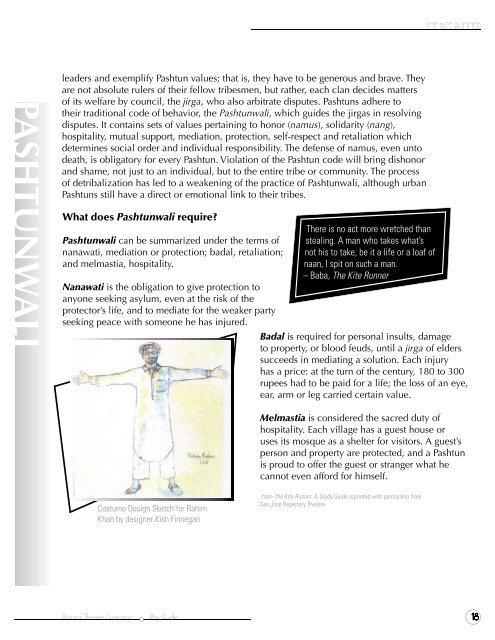THE KITE RUNNER Arizona Theatre Company Play Guide 1
THE KITE RUNNER Arizona Theatre Company Play Guide 1
THE KITE RUNNER Arizona Theatre Company Play Guide 1
You also want an ePaper? Increase the reach of your titles
YUMPU automatically turns print PDFs into web optimized ePapers that Google loves.
<strong>THE</strong> <strong>KITE</strong> <strong>RUNNER</strong><br />
PASHTUNWALI<br />
leaders and exemplify Pashtun values; that is, they have to be generous and brave. They<br />
are not absolute rulers of their fellow tribesmen, but rather, each clan decides matters<br />
of its welfare by council, the jirga, who also arbitrate disputes. Pashtuns adhere to<br />
their traditional code of behavior, the Pashtunwali, which guides the jirgas in resolving<br />
disputes. It contains sets of values pertaining to honor (namus), solidarity (nang),<br />
hospitality, mutual support, mediation, protection, self-respect and retaliation which<br />
determines social order and individual responsibility. The defense of namus, even unto<br />
death, is obligatory for every Pashtun. Violation of the Pashtun code will bring dishonor<br />
and shame, not just to an individual, but to the entire tribe or community. The process<br />
of detribalization has led to a weakening of the practice of Pashtunwali, although urban<br />
Pashtuns still have a direct or emotional link to their tribes.<br />
What does Pashtunwali require<br />
Pashtunwali can be summarized under the terms of<br />
nanawati, mediation or protection; badal, retaliation;<br />
and melmastia, hospitality.<br />
Nanawati is the obligation to give protection to<br />
anyone seeking asylum, even at the risk of the<br />
protector’s life, and to mediate for the weaker party<br />
seeking peace with someone he has injured.<br />
There is no act more wretched than<br />
stealing. A man who takes what’s<br />
not his to take, be it a life or a loaf of<br />
naan, I spit on such a man.<br />
– Baba, The Kite Runner<br />
Badal is required for personal insults, damage<br />
to property, or blood feuds, until a jirga of elders<br />
succeeds in mediating a solution. Each injury<br />
has a price: at the turn of the century, 180 to 300<br />
rupees had to be paid for a life; the loss of an eye,<br />
ear, arm or leg carried certain value.<br />
Melmastia is considered the sacred duty of<br />
hospitality. Each village has a guest house or<br />
uses its mosque as a shelter for visitors. A guest’s<br />
person and property are protected, and a Pashtun<br />
is proud to offer the guest or stranger what he<br />
cannot even afford for himself.<br />
Costume Design Sketch for Rahim<br />
Khan by designer Kish Finnegan<br />
-from The Kite Runner: A Study <strong>Guide</strong> reprinted with permission from<br />
San Jose Repertory <strong>Theatre</strong><br />
<strong>Arizona</strong> <strong>Theatre</strong> <strong>Company</strong> <strong>Play</strong> <strong>Guide</strong> 18







![Play Guide [356k PDF] - Arizona Theatre Company](https://img.yumpu.com/46218320/1/190x245/play-guide-356k-pdf-arizona-theatre-company.jpg?quality=85)




![[title of show] Arizona Theatre Company Play Guide 1](https://img.yumpu.com/24482689/1/190x245/title-of-show-arizona-theatre-company-play-guide-1.jpg?quality=85)


![Play Guide [1.2MB PDF] - Arizona Theatre Company](https://img.yumpu.com/11952176/1/190x245/play-guide-12mb-pdf-arizona-theatre-company.jpg?quality=85)
